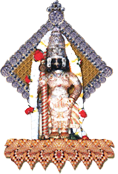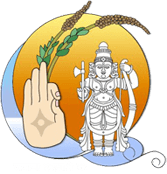न इह अभिक्रम नाशः अस्ति प्रत्यवायः न विद्यतॆ ।
स्वल्पं अपि अस्य धर्मस्य त्रायतॆ महतः भयात् ॥ २.४० ॥
ನ ಇಹ ಅಭಿಕ್ರಮ ನಾಶಃ ಅಸ್ತಿ ಪ್ರತ್ಯವಾಯಃ ನ ವಿದ್ಯತೇ |
ಸ್ವಲ್ಪಂ ಅಪಿ ಅಸ್ಯ ಧರ್ಮಸ್ಯ ತ್ರಾಯತೇ ಮಹತಃ ಭಯಾತ್ || ೨.೪೦ ||
na iha abhikrama nAshaH asti pratyavAyaH na vidyatE |
svalpaM api asya dharmasya trAyatE mahataH bhayAt || 2.40 ||
There is no loss of endeavor here (in the matter of duties which are about to be taught under the name of yoga); there arises no evil; even a little of this duty saves man from great fear (any small act of duty to God is sure to lift one from the great fear of mundane bondage)
iha abhikramanAshaH na asti
For jnAnOpAya, that is, doing duty without aspiring for the fruit or result (nishkAmakarma), which is going to be taught, there is no loss if begun.
pratyavAyaH na vidyatE
If such a thing is stopped without completion, then there will not any sin or disaster.
asya dharmasya svalpaMapi mahataH bhayAt trAyatE
Even adoption of this nishkAmakarma to a negligible extent, will save one from the great fear of samsAra.
Points:
1. Agneya Purana is quoted by Acharya. I will just give translation here.
In respect of Vishnu dharma, that is nishkAmakarma, even if begun or even if there is a desire to begin, it would bring a lot of virtue. It is NOt like other actions where the fruit of actions one gets only after completion of action. Thi is the case with all worldly works.
Even if one desires to read Acharya’s works it will bring a lot of virtue.
2. What is meant by nishkAmakarma? non-result oriented activity.
It rests on thorough self-surrender, on an implicit trust in Shri Hari, on full realization of His absolute supremacy (as per one’s capacity) and on the jIva’s utter dependence on Him.
3. abhikrama = ArOhana = ascent
Ascending to heights is NOT lost in this Karma yOga. A pilgrim on the path of Vishnu dharma is ever on the ascent, going steadily higher and higher and never falls.
abhikrama = stepping forward
Like a brave soldier who paces even onward and turns not his back, a Karma Yogin steadily paces forward and his progression is assured. No retrogression takes place.
abhikrama = war or battle
The meaning is that karma yoga does NOT entail abandonment of war.
4. asya dharmasya
The word asya=This, but here it means belonging to Vishnu. By this understanding it is made clear that Karma Yoga is Vishnu Dharma. The Sanskrit letter “a” in asya here refers to Vishnu.
5. dharmasya means yamasya
By dharma is meant yama. Though ths nishkAmakarma is done only a little, it exonerates one from the fear of death.
The best example is the story of Ajamila in Bhagavatam. By calling with great devotion to Shri Hari with the Sabda Narayana, the messenders of Yama were cleared off by servants of Shri Hari.
6. svalpaMapi asya dharmasya Even a little done should be Vishnu dharma, which means it should be out of great devotion to Vishnu and understanding His supremacy and independence and at the same time experiencing the utter dependency and helplessness of jIva.
7. Srimad Bhagavatam 6:2:14
sāńketyaḿ pārihāsyaḿ vā stobhaḿ helanameva vā
vaikuṇṭha-nāma-grahaṇam aśesa agha-haram viduḥ
Wise say to utter the name of Vaikuntha conventionally or in joke or without any purpose or in ridicule is the cure of the sins.
The above verse in Bhagavatam should NOT be taken literally. It simply shows the indispensable act of uttering HIS names.
Otherwise asuras like Sishupala, Duryodhana etc. should have attained moksha. Making jokes or ridiculing His names are very disastrous and sinful. Hence uttering His names out of devotion will clear our sins.


